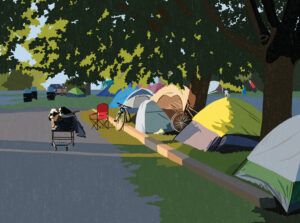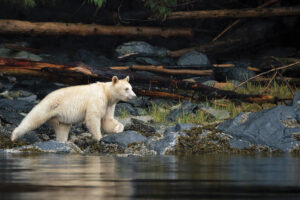
People & Culture
Kahkiihtwaam ee-pee-kiiweehtataahk: Bringing it back home again
The story of how a critically endangered Indigenous language can be saved
- 6310 words
- 26 minutes
This article is over 5 years old and may contain outdated information.
People & Culture

Sometimes I find it hard to believe in God and spiritual things. The bustles and rush of life seem to squeeze any sense of wonder, of majesty, of “something else” from my life leaving a sense of loss. Being an optimist, this is hard to take.
Living outside in nature for many weeks connects me to God. But nature isn’t the end goal. No, it’s a means (like a bus or subway ride) to get me to a destination. In a way nature transforms me out of the chaotic schedules, ringing cell phones and incessant 21st century race that dominates our lives. It crowds in on life.
In nature I can hear the birds singing in trees, smell the scent of pines drifting on the wind or watch a dragonfly patrol an empty beach. Caught up in life’s normal frenzied pace, I would have missed these experiences.
An Italian motto speaks of “the beauty of doing nothing.” Some people think that “doing nothing” equates to wasting time or laziness. But don’t you get some of your best, most creative thoughts while lazing in the shower on a Saturday or Sunday morning? When our minds are at rest it allows them to drift outside the well-defined box imposed by our many pressing schedules. And a mind at rest is incredibly dynamic and creative.
A time of silence, of solitude, of “laziness” (like the one I’m taking in the Yukon wilderness this summer) is vital for physical and mental health. It’s not superfluous.
These weeks alone in silence and solitude free me to think outside the many little boxes I’ve allowed to clutter up my life. I can see new horizons that just a month ago were beyond my imagination.
But time of silence and solitude is not of itself reality. It’s just a stage — though an important one — like one of those bus or subway stations. We humans are not meant to be alone, living solitary lives. We are made for community with others.
And so the silence and solitude are good, but only because they help me re-order life priorities so I can re-enter society rejuvenated and refreshed, better able and willing to serve others.
Allen Macartney is completing a solo trip on the Yukon River to retrace the route of prospectors in the days of the Klondike gold rush. Read more of his blog posts and learn about his Royal Canadian Geographical Society-funded expedition.
Are you passionate about Canadian geography?
You can support Canadian Geographic in 3 ways:

People & Culture
The story of how a critically endangered Indigenous language can be saved

Places
In Banff National Park, Alberta, as in protected areas across the country, managers find it difficult to balance the desire of people to experience wilderness with an imperative to conserve it

People & Culture
For unhoused residents and those who help them, the pandemic was another wave in a rising tide of challenges

Wildlife
How ‘maas ol, the spirit bear, connects us to the last glacial maximum of the Pacific Northwest